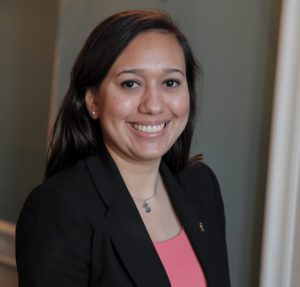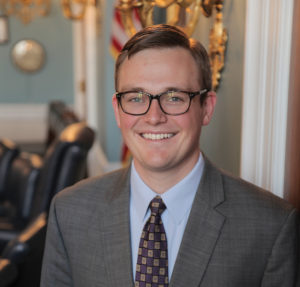
Swipe For More >
A Path to Washington: Young Leaders Stride to Success After a Start with Sorghum
Former National Sorghum Producer interns and National Sorghum Foundation scholarship recipients find success in Washington, D.C. With diverse backgrounds and future ambitions, they are a testament to the rich array of people involved with NSP.
 Yasmin Rey was a shy young woman. Growing up in Lubbock, it was a natural decision to stay close to home and pursue a college education at Texas Tech University. She chose a degree in agriculture because her dad’s family farmed in Mexico, and she desired to carry out the American dream set forth by her parents in a career field she felt gratitude toward.
Yasmin Rey was a shy young woman. Growing up in Lubbock, it was a natural decision to stay close to home and pursue a college education at Texas Tech University. She chose a degree in agriculture because her dad’s family farmed in Mexico, and she desired to carry out the American dream set forth by her parents in a career field she felt gratitude toward.
Plant and soil sciences is where she began her secondary education. Rey found a job as a lab assistant with the U.S. Department of Agriculture’s Agricultural Research Service where she quickly discovered she did not necessarily enjoy the repetitive nature of her work. Nonetheless, she was committed to a path working in agriculture and changed her degree to agricultural communications.
Her reserved but determined spirit for fulfillment and individual success led Rey to another life-guiding decision. Her sophomore year she applied for the congressional internship program in Washington, D.C. She didn’t get it.
Opportunity knocked Rey’s junior year when a communications internship announcement with National Sorghum Producers came across her inbox. She applied, and her passion to work hard and make a difference landed her the job.
Rey still had her sights on the congressional internship program, and her time with NSP gave her the experience and confidence she needed to pursue that dream. Her second application took her to Austin during the 84th Texas legislative session. Her sights on D.C. remained.
 Garrett Kays
Garrett Kays
Growing up in rural southeast Kansas on his family’s beef cattle operation, Garrett Kays was a sharp and likeable farm kid. His family, generations deep with purple pride, lead to an unquestionable decision to plant his first set of roots off the farm in Manhattan at Kansas State University where he studied agricultural economics.
Kays took a student position in the office of government affairs at K-State. His first internship was with the Kansas Department of Agriculture where Kays saw for the first time how public policy shaped agriculture and the role state agencies play in promoting farmers and ranchers.
Thirsting for more knowledge about public policy and professional improvement, Kays sought an opportunity from the National Sorghum Foundation through what was then called the Sorghum Challenge Scholarship. He was awarded a stipend toward tuition plus a trip to Washington, D.C., with NSP during its annual legislative fly-in, his first trip to the U.S. Capitol, stirring a desire to return one day.
 Shelbi Knisley
Shelbi Knisley
Shelbi Knisley’s first exposure to agriculture was through 4-H and FFA programs growing up in Corsicana, Texas. She fell in love with agriculture through these pursuits and chose to attend Texas Tech University where she studied agricultural economics and general business—an accounting career in mind.
An assured and competent freshman student, Knisley was approached during the summer by one of her economics professors with an opportunity to work for the firm Combest Sell & Associates. That was her first exposure to agricultural policy, and suddenly, accounting no longer held her attention.
Following this newly sparked interest in ag policy, Knisley was advised in a new direction by her professor. He told her to intern at NSP. She trekked to Washington, D.C., with staff to meet with other commodities during the 2013 GMO wheat scare in Oregon. Hearkened to passionate agriculture producers and representatives, she developed a will to be a future advocate for their cause and an aspiration to return to Washington.
Fulfilling a Dream to go to DC
Rey, Kays and Knisley were all on a path to intern in D.C. Rey and Knisley worked for the U.S. House Committee on Agriculture—Knisley for Frank Lucas (R-OK) when he was at the helm of the committee during the 2014 Farm Bill and Rey for Mike Conaway (R-TX) after he became chairman. Kays interned for his home-state Senator Pat Roberts (R-KS).
Each one attributes a portion of their success and this step in their careers in public service to experience with NSP and producer advocacy.
“I think my sorghum internship really sparked my interest in going to Washington,” Knisley said. “I just knew that was where I was supposed to be working, and I wanted to get involved and work with farmers, knowing that whatever I am doing is for them.”
Kays said he had never seen what a national organization does on behalf of its members, and his key take-away from his trip to Washington with NSP was that farmers are smart and passionate people who care not only about the issues but relationships within the industry.
“I distinctly remember a Kansas farmer named [Larry Dahlsten] spending so much time with me and making sure that I learned and had a good experience. He seemed very invested in me,” Kays said. “Larry cared about me and showed how in ag we build long-term relationships.”
Rey said her internship with sorghum directly correlates to her success and where she is today.
“That’s where it all started,” she said. “I would not have been able to go to Austin without the experience I had at sorghum, and I know that was something that set me on a path to succeed because I was very shy and needed to get out of my box.”
Once each had a taste of what life is like living in D.C., their fate was sealed.
Kays’ Path to Trade Policy
Kays finished college in Manhattan, working for Senator Jerry Moran (R-KS). He graduated then moved to Moran’s Washington office. In 2017 he was hired by the Office of the U.S. Trade Representative and now works as the confidential assistant to the recently appointed Chief Agricultural Negotiator Gregg Doud. With current action on China’s anti-dumping and countervailing duty investigations into imports of U.S. sorghum, Kays has found his background and experience with sorghum particularly valuable.
“Being able to go to an agency that advocates for sorghum producers and being able to speak eloquently on some of their issues but also just the basics of the crop has been valuable for me,” Kays said. “Where sorghum is grown and the unique issues that face sorghum are all things I have literally taken and used during my time here at USTR.”
Rey Takes on First Farm Bill
At the completion of Rey’s internship with the House Agriculture Committee, she was offered a chance to stay and work as a staff assistant, a typical starting position for interns looking to remain in Washington, D.C.
“It was just such a great experience that I couldn’t turn [the offer] down,” Rey said. “I never imagined I would stay here as long as I have or be doing what I am, working on nutrition right now. It has been a crazy road to get here, but it’s been great.”
Working on one of the more controversial farm bill titles, Rey is in the thick of current policy making decisions on nutrition benefits. She said working at sorghum taught her the flexibility she needs to survive times like these, and she is glad to still have sorghum in her corner.
“As far as the different projects that helped me the most in my legislative assistant portfolio,” she said, “it’s knowing that every single day is different, and you’re going to have to jump from project to project and be ready for whatever pops up that day.”
Knisley Brings Data to International Market Decisions
Knisley obtained a master’s degree, focusing her research on the sorghum trade market in Australia. In her job search, she came across an opportunity at USDA’s Economic Research Service—a position that was similar to her grad work.
Soon after, she transitioned to the international grains market working on oil seeds. That led to her current, wheat-focused position at USDA’s Foreign Agricultural Service. She still works with producer organizations and individual farmers as she set out to do with the addition of promoting the U.S. export program overseas.
“I have to use all of my background, and I have to know the policies,” Knisley said. “That’s where my experience at Combest Sell and working with the sorghum group come in. All of that knowledge built on top of each other helps me understand the market better, so I can put out good information that farmer groups can use to advocate for their industry.”
Knisley said aside from the knowledge she gained, a passion for what she does came from observing a sorghum industry that cares.
“It’s very motivating for interns to see how excited the sorghum guys are about what they are doing,” she said. “It’s just a reminder to me to remember that you need to be excited and passionate about what you’re doing.”
Investing in the Future
Kays said the passion and understanding farmers have for long-term public policy impacts and what makes a strong and sustainable agriculture industry are two things he has seen from producer organizations like NSP. Advocating for yourself is investing in your future, he said.
“The generosity of farmers in rural areas, especially toward rural kids, is greatly undersold from the appreciation that rural students have,” Kays said. “The generosity of sorghum producers helped enable me the ability to do these kinds of internships in D.C. where sometimes other people may not have had the opportunity.
“I would not be here today if it was not for the generosity of so many people, including sorghum producers.”
Disclaimer:
The views and opinions expressed in this article are those of the sources and do not necessarily reflect any official policy or position of any U.S. government employer.
Editor’s Note:
National Sorghum Producers is proud to honor the achievements of these three young people and commends their ongoing efforts to serve others through their respective interests. These are only a few of many former interns and scholarship winners we consider members of our extended sorghum family, and we take courage knowing future decisions that impact sorghum farmers and the agriculture industry are in their hands. It is important as an industry we continue to give back and invest in young, talented individuals like these who understand the sorghum industry, rural America and the challenges we face as we strive toward something better on behalf of sorghum farmers and the industry each day. To learn more about current scholarship opportunities read page 34 or visit www.SorghumGrowers.com.



